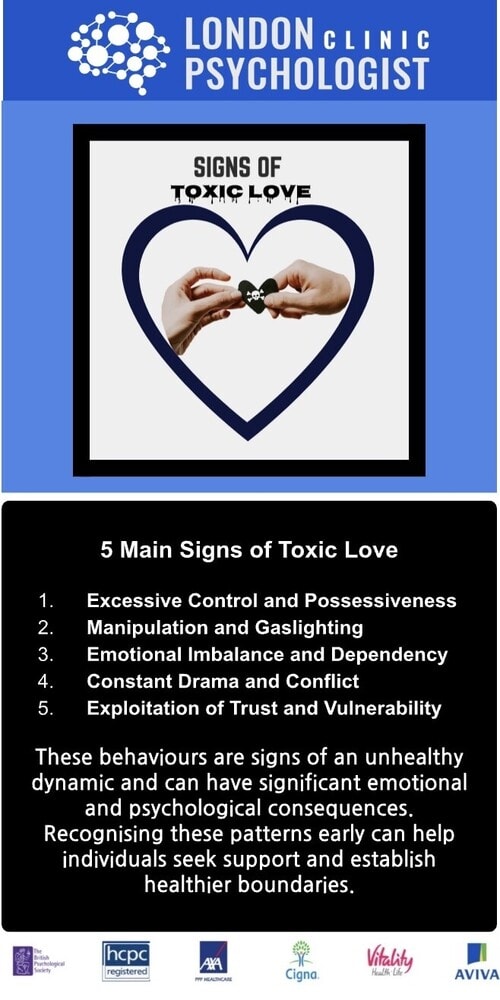When Love Turns Toxic

posted 28th January 2025

Love Fraud: Recognising Emotional and Financial Manipulation in Relationships
Love fraud is a term used to describe relationships where one partner manipulates or deceives the other for personal gain, often involving financial exploitation, emotional manipulation, or both. While the term "love fraud" isn’t a formal psychological diagnosis, the behaviours associated with it align with established concepts like coercive control, narcissistic abuse, and financial exploitation. This article explores how love fraud manifests, provides examples, and explains its psychological underpinnings for individuals seeking support or clarity from a psychologist clinic.
Love fraud involves building a romantic relationship under false pretences with the primary goal of exploiting the other person for financial, emotional, or material gain. This often involves manipulative tactics such as feigned affection, promises of a future together, or guilt-tripping, leaving the victim emotionally vulnerable and financially at risk.
Love fraud can overlap with behaviours recognised in the DSM-5, such as traits of narcissistic personality disorder (NPD), antisocial personality disorder (ASPD), or patterns of coercive control often seen in abusive relationships. In the UK, behaviours associated with love fraud can be prosecuted under laws related to fraud, domestic abuse, or coercive control.
Examples
1. Financial Exploitation Through False Promises
Example: A woman begins a relationship with a man who recently inherited a large sum of money. She quickly establishes emotional intimacy, moves in with him, and suggests they start joint financial ventures. When he hesitates to share financial access, she accuses him of not trusting her, pressuring him to combine finances. Once she gains access, she withdraws significant amounts and disappears.
Psychological Link: This behaviour is a form of financial abuse, a subset of coercive control, where the abuser manipulates access to financial resources to gain power.
2. "Future Faking" to Gain Commitment
Example: A partner showers their significant other with affection and speaks frequently about a future together—marriage, children, and shared dreams. Once the victim is emotionally invested, the abuser begins demanding financial support, claiming they need help for their "future together." If the victim questions the demands, they are accused of not being serious about the relationship.
Psychological Link: This aligns with patterns of narcissistic abuse, where manipulation and control are achieved through false promises of a shared future.
3. Exploiting a Vulnerable Partner
Example: A man meets a woman struggling with depression and presents himself as her saviour. He gradually takes control of her finances under the guise of helping her "manage things." He isolates her from friends and family, monitors her correspondence, and controls how her money is spent.
Psychological Link: This behaviour is consistent with coercive control, a legally recognised form of domestic abuse in the UK. Isolation and financial manipulation are common tactics in abusive relationships.
4. Contacting Past Partners to Build Evidence
Example: A woman contacts her partner's ex-girlfriends under false pretences, pretending to be concerned about his behaviour. She gathers information to later accuse him of being abusive or manipulative. The partner becomes defensive, feels guilt-ridden, and complies with her increasing demands to "prove his love."
Psychological Link: This tactic falls under gaslighting, where the abuser distorts reality to undermine the victim’s confidence and assertiveness.
Victims often struggle to recognise love fraud due to the manipulative nature of the behaviour. Here are key red flags:
1. Emotional Manipulation
Rapid escalation of intimacy (e.g., "love-bombing").
Over-the-top promises of a future together, often inconsistent with reality.
Guilt-tripping when questioned or denied access to money or resources.
2. Financial Exploitation
Pressuring for financial access (e.g., joint accounts or loans).
Consistent "emergencies" requiring monetary support.
Accusations of financial abuse when boundaries are enforced.
3. Control Tactics
Isolating the victim from friends, family, or support networks.
Reading private correspondence or monitoring their activities.
Contacting ex-partners or others to gather information to use against the victim.
Psychological Profiles of Perpetrators
While not all individuals who commit love fraud have formal psychological diagnoses, their behaviours often align with specific personality traits or disorders, such as:
Narcissistic Personality Disorder (NPD): Grandiosity, lack of empathy, and manipulative behaviour.
Antisocial Personality Disorder (ASPD): Deceptive and exploitative tendencies, with disregard for others’ rights.
Borderline Personality Disorder (BPD): Intense relationships with unstable interpersonal dynamics, sometimes involving manipulative behaviours.
Why Do Victims Stay?
Victims of love fraud often feel trapped, even when they recognise the abuse. Common reasons include:
Shame: Embarrassment about being deceived or exploited.
Fear of Being Alone: Emotional dependency on the abuser.
Hope for Change: Belief that the abuser’s behaviour will improve.
Gaslighting: Manipulation that makes the victim doubt their perceptions.
How to Protect Yourself
If you suspect you may be a victim of love fraud, consider the following steps:
Set Boundaries: Clearly define what you are and aren’t willing to share, particularly in terms of finances.
Document Behaviours: Keep records of financial transactions, correspondence, and unusual behaviour.
Seek Support: Consult a psychologist or trusted friend to gain perspective.
Trust Your Instincts: If something feels off, don’t dismiss it. Manipulation often thrives on doubt.
Know the Law: In the UK, coercive control and financial abuse are legally recognised forms of domestic abuse.
How Our Clinic Can Help
At our clinic, we’ve worked with patients who were unaware they were victims of love fraud. Through therapy, we help:
1. Identify patterns of manipulation and coercion.
2. Build self-esteem and emotional awareness to establish healthier boundaries.
3. Develop tools to regain control of finances and relationships.
For those questioning their relationships or feeling confused about their dynamics, our psychologists offer a safe, non-judgmental space to explore these concerns.
Love fraud is a complex and devastating form of manipulation that exploits emotional vulnerability and financial trust. Recognising the warning signs and understanding the psychological mechanisms behind it are essential for protecting yourself and others. With professional support, victims can break free, rebuild their confidence, and create healthier, more secure relationships.



